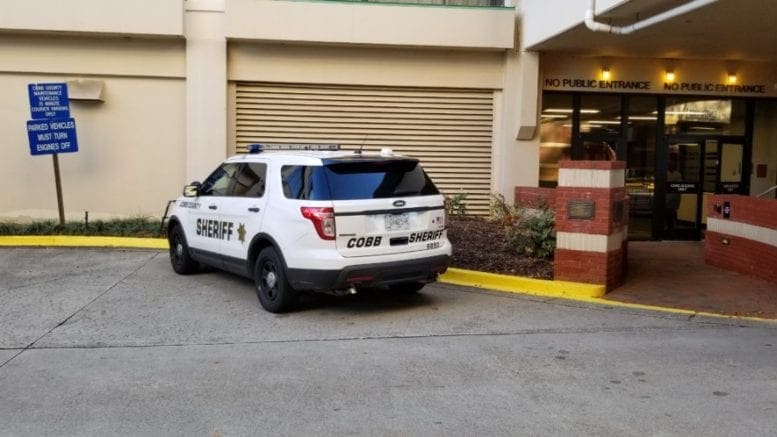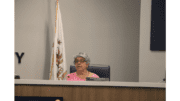By Sarah Atsu
In honor of April being Distracted Driving Awareness month, the Cobb County Sheriff’s Office is motivating civilians to put aside distractions and focus when they get behind the wheel.
According to the National Highway Traffic Safety Administration, “…any activity that diverts attention from driving” is considered distracted driving. This includes but is not limited to, talking to people in the vehicle, adjusting the stereo, eating, drinking, or using a phone or other technological devices.
Technology’s effect on the issue
Lt. Gorski, a lieutenant of the Fugitive Apprehension Support Team of Cobb County’s Sheriff’s office, says technology is one of the main causes of the rapidly expanding issue of distracted driving today.
“[Distracted driving] is an issue that grows every day and is constantly exacerbated by the onset of technology,” says Gorski. “With more and more technology, every day we spend more and more time on our phones, and the more time we spend on them, the more likely we are to continue to play with them as we’re sitting behind the wheel of a car.”
Gorski describes technology and the wealth of information personal devices give us access to as addictive.
“[The amount of information technology allows us to have], is kind of like an addictive drug,you are searching for your next dopamine hit to make you feel excited,” says Gorski, “we just have to see what’s on our Facebook feed, we need that fix. We need to figure out what’s going on in the world and with the people around us.”
Many people do not realize that in the brief amount of time that it may take to read or send a text, a moving vehicle can cover a lot of ground. NHTSA reports that in five seconds, driving at 55 miles per hour, a vehicle covers the length of an entire football field. Anything can happen in that period.
The legal side
Georgia does have laws in place governing the use of technology in vehicles.
The Hands-Free Law in Georgia took effect on July 1, 2018. According to an article from the Georgia Governor’s Office of Highway Safety, this law restricts two types of devices in specific: ‘stand-alone electronic devices’ and ‘wireless telecommunications devices. Stand-alone electronic devices are devices that are not wireless but can be used to view video or audio on demand. Wireless telecommunications devices are devices that can be used wirelessly.
Neither of the two types of devices specified in the law is permitted to be used in a vehicle that is not in the legally defined parked position.
According to Georgia law, a ‘parked vehicle’ is a vehicle that is in a zone specifically designated for parking such as a parking space or driveway, and in the ‘parked’ position. This means that usage of a device at a red light or on the shoulder of the road is also not permitted, regardless of whether or not the vehicle is in ‘park’.
Despite these laws, many people continue to use their devices at inappropriate times, and with the roadways being widely utilized by both vehicles and pedestrians, it only takes one distracted driver to cause a tragedy.
About four to five years ago, Gorski says, a man was hit and killed by a distracted driver as he crossed the street on Powder Springs Road. This is just one of the many tragic tales caused by distracted driving.
Inform, educate, and enforce
While law enforcement’s job is to enforce the law, there’s only so much officers can do.
“There are so many more people than there are officers,” says Gorski, “we cannot be there to catch every single person that’s breaking the law and unfortunately they will continue to do so until a tragedy occurs… That’s why it’s up to all of us to inform, educate, and enforce the laws on both ourselves and the people around us.”
Inform, educate, and enforce are the three steps to law enforcement. Firstly, people are informed of the rules that are in place. Secondly, they are educated on them as the rules are explained. Finally, the rules are enforced by consequences. In the law, these consequences are typically a fine, points on a license, or jail time, but these steps can also be transferred to the daily lives of regular people.
“If you’re in the car with a friend and they pick up that phone, don’t be afraid to call them out,” Gorski says. “[Inform and educate] them on the dangers of distracted driving, and let them know that if they continue to use their phone as they’re driving, you’re not going to be able to ride with them anymore.”
Group actions such as family and friend groups pledging to be safe drivers and utilizing phone functions to mute notifications as you drive are some other ways regular people can help combat distracted driving.
Gorski says that in his house he tells his children to put their phones on ‘do not disturb’ as they drive to avoid distractions. In his work life, Gorski says that he utilizes the text-to-voice function for important documents and messages to be read to him by his devices. Additionally, instead of texting, he uses the ‘hey Siri’ function on his iPhone to call in response to messages that require an immediate response.
Take your time
The only thing a person can never get back is time. Only a finite amount of time exists, and even less of that is made available to each individual. Because the time we have is so limited, many people try to make the most of all their time by multitasking as much as they can, even as they drive. Despite this, Gorski stresses that as people travel they should give themselves the necessary amount of time required to focus solely on driving and driving safely.
“We need to try and allow ourselves time and stop doubling down on things and trying to cram more into the same amount of time,” says Gorski, “we must give ourselves an allowance of time to travel and to get to wherever we need to go.”

Sarah Atsu is a 20-year-old Kennesaw University journalism student. She has a passion for writing and story-telling. She is in her junior year of college and hopes to study law after she graduates.




